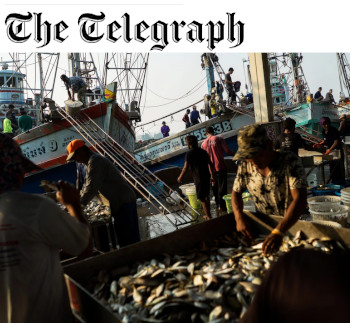|

Image: The Telegraph / FIS
Thai seafood is once again being linked to modern slavery
 THAILAND
THAILAND
Thursday, March 21, 2024, 07:00 (GMT + 9)
The following is an excerpt from an article published by The Telegraph:
Lawmakers draft new legislation that weakens seafarer protections, sparking fears of a return to the ‘bad old days’ of trafficked labour

Source: Human Rigth Watch
Tuna, prawns and crab from Thailand could be removed from supermarket shelves in the West if the southeast Asian country waters down laws designed to protect seafarers, say European officials.

Investigations a decade ago revealed that fishermen were being trapped on Thai ships for years as modern slaves. Many were brutalised and reports of murder also surfaced, while illegal, unreported and unregulated (IUU) fishing flourished.
The situation was calmed at the time by the introduction of legislation designed to protect workers and international sanctions were avoided.
Now, however, Thai lawmakers are drafting new legislation which looks set to drastically weaken those protections.
According to analysis from the Environmental Justice Foundation, an international environmental NGO, they include amendments dropping the necessity of a crew list when leaving the docks, and enabling the transfers of workers and products from one boat to another at sea.
.jpg)
“The new Thai government of [prime minister] Srettha Thavisin is pursuing a policy of human rights and environmental backsliding in the fishing sector out of a motivation that contains equal parts of greed, ignorance and denial,” said Phil Robertson, deputy Asia director at Human Rights Watch.
“If the proposed changes in law go through, Thailand will return to the bad old days of at sea transshipment of product and fishermen that fueled the systematic and pervasive use of trafficked labour to underpin IUU fishing schemes.”
Prodprasop Suraswadi, an advisor to the prime minister, told a recent panel in Bangkok that the changes were needed because current legislation is overly bureaucratic and burdensome, contributing to reduced exports and profits. He added that they were enacted by an unpopular and undemocratic military-backed government, following the 2014 coup.
A spokesperson for Move Forward party, which supports the changes, added: “Our stance on amending the fishery law is to amend the punishment clauses to be fairer and more proportionate to the crime.” He insisted some of the changes would not “create loopholes that could lead to labour abuses”.

Source: Greenpeace
But an EC spokesperson told the Telegraph that a “yellow card” – which was first introduced in 2015 – or other sanctions could be applied if plans to undo regulations continued. This could potentially restrict or even halt trade, hitting Western consumers.
“The Commission is very concerned about Thailand’s legislative proposal,” a spokesperson said, adding that the bloc considers the changes as a “substantive relaxation of the current rules” which are “not in line with Thailand’s obligations under international law”. [Continues...]
Author: Sarah Newey | The Telegraph | Read the full article by clicking the link here
editorial@seafood.media
www.seafood.media
|



